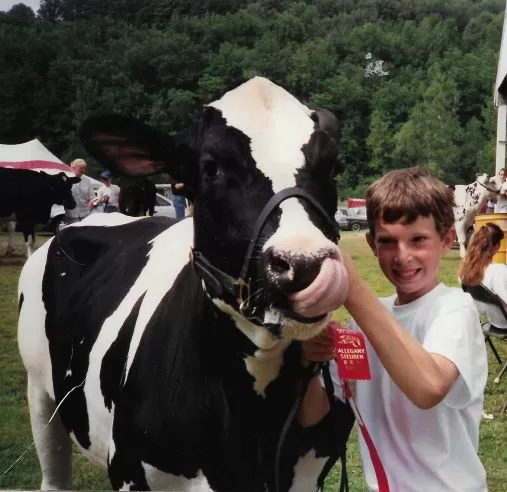The Steuben County Fair marked both the end of summer and a chance for farm kids in our area to hang out together under the guise of showing cattle. It was a break from the things required of us at home and a chance to spend time with peers of a similar experience—something that was usually impossible in the small towns we came from. We got up in the dark every morning to wash our show string, clipped all day, showed them on Wednesday and Thursday, and appreciated the process.
We also enjoyed the times we weren’t showing. Once in a while we sat on our show chests playing euchre and talking idly, but more often than not we dropped fake spiders on passer-bys, locked each other in trailers, moved show boxes in the night and trapped people in square bales while they slept. One year someone won a pair of handcuffs in the ring toss game on the midway. As a result, we gang-rushed Ben Bossard, cuffed his hands behind his back, and chased him behind the barns. While we were having our fun we were seen by the row of houses that bordered the fairgrounds. Someone called the police and reported an escaped convict on the loose. Ben Bossard spent the rest of the day hiding in the haymow of the horse barn—still cuffed—while the police searched the 4-H barns.
My first year of college I attended Alfred Tech, a local two year state school. Even though I wasn’t taking any ag courses, I fell in with the other farm kids and eventually became a formal member of the Collegiate Agricultural Leaders Club. The CAL Club petitioned the college for funding to see the Royal Winter Fair in Toronto, explaining the ways in which it would benefit our education and make us better captains of the dairy industry. The van pulled into the city and slowly rolled down Young Street. Influenced by the bright lights around us we made a collective decision that we could always find plenty of cows in our own barns when need be, and instead wanted to see something that we couldn’t on our farms at home. Instead of the Royal we ventured into the late bars and strip clubs, returning hungover a few days later to remark to the administration of the high quality of the things we had seen.
Those that know what it means to farm also know what it means to not have to farm at a given moment. The act of farming can feel like balancing scarcities, and time is often the resource that is hardest to come by. In some instances, it can feel so unnatural to have a moment to yourself that it leads to, if not twinges of illogical guilt, at least pressure to use it wisely. It is this feeling that can make a farmer simply find other work to do and one of the reasons young kids look for any trouble they can get into at the fair. At one point the only night my family didn’t milk themselves was on Wednesday. My father always made sure we were away from the house one way or another, whether visiting grandparents, going to high school girls’ basketball games, sledding down the hill or playing paintball in the dry cow pasture. He was usually generous and let my sister and me have the semiautomatic guns while he took the cheaper, single-shot version. The dynamic of the game changed if he had the better gun. His default strategy was to shoot into the bush my sister or myself squatted behind until we eventually screamed and gave up. The hours between chore time and bed time were not taken lightly.
While the value of hard work is often recited in connection with the concept of farming, the value of not having to work hard at a particular moment is also a lesson internalized by the sons and daughters of farmers. Although it’s been a while since I was in high school, the image I have of town kids is that of someone bored, roaming around in small bands to find ways to entertain themselves. They schemed in study hall about finding something to do on the weekend. This was never a problem of my 4-H friends. Long summer days spent in a tractor cab gives one a chance to think about all the things we would like to do if given the chance. Perhaps that is why many of them did well in college, sometimes with PhDs and other distinctions, and those that did not come back to the farm were successful in their chosen professions.
While milking cows, feeding heifers and running the tractor were a part of us, we did it enough to know that when these things weren’t required that the time given was valuable and we had better make use of it. Time would be short until we were back in barn clothes again, thinking about what we could do if not under a cow or with a pitchfork in our hands. Because of this, the annoying 4-Her that just dropped a spider in front of you will probably do things he shouldn’t in college, but he’ll also do plenty of other good things with himself, even if it’s shooting his kids with paintballs in the dry cow pasture.
*
This article is part of The Milk House column series, published in print across three countries and two languages. It can also be found at themilkhouse.org.
This article appeared in a similar form in Progressive Dairyman.

